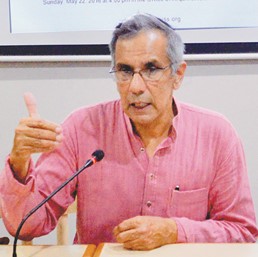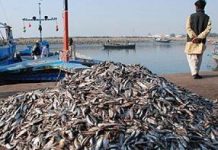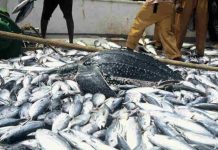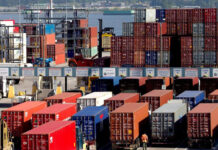By now, it is abundantly clear that the Pakistani economy is not working, at least not for the overwhelming majority of the people in the country, and perhaps not even for the politically well-connected rent-seeking elite for whom the entire economic structure has been distorted in the first place. What, then, is the way forward? The Imran Khan Administration’s economic team, led by Finance Minister Asad Umar, appear to be taking a long time in getting settled in and appear indecisive about what to do next. We at Profit thought we might try to help them along.
Profit contacted five of the top experts on the economy to get their version of what is the right thing to do to put the economy on the right track in the backdrop of falling exports and balance of payments crisis. All five have either directly worked in the government, or else been in a position to advise the government or key figures in the country’s ruling political parties. And four out of the five have doctoral degrees in economics or related disciplines.
These accounts were narrated individually to Taimoor Hassan. They are presented here, without comment from Profit’s usually opinionated editorial staff. [Editor’s Note: That seems harsh. True, but harsh.]
1Economic reform without political consensus is impossible

Technocratic solutions are not enough; Pakistan needs to have major political parties agree on the broad contours of economic policy
Dr S Akbar Zaidi
Reform of Pakistan’s economy should be undertaken after considering both economic and political factors. In deciding policy directions and reforms, you have to get the political parties together to form an agenda which all broadly agree upon, that certain things vital for the economy and for the well-being of the people, like taxation reforms, should not be messed with regardless of the party in power.
There should be a minimal consensus between all the political parties of letting a policy continue if a change is to be expected. This predominantly requires one to know what a certain political party wants to achieve and what it wants to do that is going to set the direction of the economy for the long and medium term. Basically, what Pakistan requires today is a robust taxation system, completely revamped and expanded.
Today, less than 1% of Pakistan’s population pays income tax, and most do so involuntarily since their tax is deducted at source. The government should go after tax defaulters and extract money from them. In revamping all this, technocratic solutions are useless. All the parties know that revenue needs to be enhanced. If all the major parties form a consensus, a lot can be achieved.
There is a dire need to rationalize taxes across all the verticals. Many sectors of the economy, like agriculture and industries, decry multiple layers of taxation by the state which need to be rationalized in such a way that they are uniform as well as progressive. There are certain categories which can be taxed, like income, wealth and consumption. Tax should be based on income and wealth, not through an indiscriminate indirect tax mechanism.
A major part of the expenditure goes to defense which needs to be waned and directed towards expenditure on social sectors such as healthcare and education. Pakistan should invest more on schools, hospitals, social development infrastructure, and the knowledge economy.
Things have changed now. Our exports are particularly poor and I do not yet see hope in achieving anything through our existing exports. Our exports are hopeless, we have hardly diversified and been dependent on the same export mix for 50 years. There is nothing we can do with our current exports. All we have is kinoos, dates and some textiles. There is little of value that we have that can be exported to increase foreign exchange. No matter how much we devalue our currency, our exports cannot be increased in their present form. We need to be brave enough to accept this.
The export structure needs a complete overhaul and we need to explore new areas, products and services, where we can gain something in the medium to long-term. The challenge lies in investing in the knowledge economy, information technology (IT) and software. That is where we should be heading now. Our industries are outdated. In the current circumstances, we should forget that we can capture any market through exports. Any efforts to improve the old export model will be counter-productive.
In trying something new, we should focus on developing the IT sector in the country and improve health infrastructure so that people can come to Pakistan to get healthcare, just like India. India is an exporter of health services now, which Pakistan can achieve as well if we prioritize our health sector. Pakistan can also venture into the pharmaceutical industry and encourage exports in that sector.
With textile and cotton, our exports have been static for a long time. We have devalued our currency by almost 35% in just one year and yet our exports have fallen. This will give an idea of our export competitiveness and also about how little devaluation helps our exports. So, it is a completely different restructuring of the economy that we need to direct it towards growth.
The import substitution strategy that the current government is trying to embark upon cannot work in the present circumstances, especially in the presence of a free trade agreement (FTA) with China. The FTA has destroyed the local market. Import substitution is a good slogan but cannot be given importance in the current circumstances. If import substitution is to work, Pakistan should venture towards the knowledge economy and build the capacity to substitute.
The government should provide incentives to certain industries where it sees a high potential for investment, exports, and foreign exchange. Such industries should be protected but not for an indefinite period of time. There should be a timeline and scale defining how the government is going to intervene in a particular sector or industry, and how it is going to be incentivized for a certain period before it becomes uniform for everyone. Incentives should not be for life but they should be there in a rational way if the government wants to increase income and reduce unemployment.
Things can improve considerably if Pakistan’s agriculture sector is reformed, which requires improvement in the irrigation and water distribution system.
Pakistan should actually stop cultivating sugarcane because it consumes a lot of water. We are a water scarce country. There are other healthier alternatives to sugarcane that consume less water. Importing sugar would be a more sensible decision than producing it locally because the international price for sugar has fallen but our prices are higher. But the local price is protected here. There is a considerable political rent that the sugar barons extract out of this sector. There is a potential to reform the whole sector but there is a huge mafia behind the sugar industry so this would be particularly hard to achieve. The sugar sector is patronized by powerful political interests who will not allow any changes. We can grow wheat, barley, and cotton instead. But the government needs to ban underproductive crops.
Import tariffs are a revenue measure but Pakistan cannot rationalize import tariffs as long as it is a part of the World Trade Organization (WTO). And tariffs are a global phenomenon. There is an ongoing tariff war between America and China. If one country increases the tariff for the other, it is responded in a similar manner. The suffering and loss are eventually mutual. Pakistan cannot increase import duties as such.
But if we are able to restructure the system of taxation, which has a component of value-added tax and consumption tax, and income tax is structured in a way that taxes are paid by those who have money, then there is no real need to impose import duty tariffs. Governments levy import duties as a measure to increase revenue so if there is a proper taxing system in place, there is no such need.
But the present trajectory of the government is unknown. It has been five months now that the Pakistan Tehreek-e-Insaaf (PTI) government has been in office. That is almost 10% of the total tenure of the government and yet there is no clear policy direction, vision or even a decision of what the government wants to do next. The growth rate has been predicted to be around 3% for the year and inflation has started rising again. Complacency and indecision by the government have marred the economy with uncertainty, which can wreak havoc of monumental proportion.
These persisting problems have not been created by the PTI and they are not responsible for them. However, they now have to take responsibility for what happens over the next five or so years. They cannot keep blaming the past governments or corruption and have to start by taking decisions to put things in order. Procrastination and indecision, which have both created uncertainty regarding the economy, must come to an end. It is time for the government to act and take decisions rather than dilly-dally.
Akbar Zaidi is a Political Economist based in Karachi. He teaches at Columbia University in New York, and at the IBA in Karachi.








First step would be to ban all mainstream private media channels and end this 24 hour circus where anchors who also happen to be the most knowledgeable economic experts criticize each and every move by Govt. and make everything debatable and political just to boost their ratings at the expense of national interests.
This is because in order to fix Pakistan’s economy, tough steps like removing subsidies on gas etc, privatization of sick units like PIA, Steel Mills, banning useless imports and importantly establishing ruthless and quick accountability across the board for corrupt people and systems need to be undertaken. There will definitely be a public outcry fueled by political parties who would naturally oppose everything. But without the mainstream media, it won’t lead to societal issue and hence national interests would be better served if ‘paid’ media is kept at bay.
What a strange comment. Instead of banning the mainstream media, Maybe you should try switching off the channel instead?
You rightly point out some of the demons plaguing our economy and banning media is not an issue. If you restrict access of general populace to information/news than don’t you think you are creating and giving rise to societal issues?
@ Author: Great work and great insights!
However, inclusion of some experts who were involved in previous administrations and were part of creating the problem is strange in my view. Maybe some input from more experts would have countered this.
As far as fixing the economy goes, we as a nation should try to support our local startups. Look towards alums of incubators and accelerators, provide feedback and try to take the first step in creating jobs for others.
Thank you Profit for providing quality content.
I subscribe the views that media should be controlled and anchors be removed from their jobs .Anew and young and proper qualified can easily replace them. the two brothers zubair and Umer will play havoc wit economy. their only qualificationa are that are sons of a corrupt general and very ordinary graduates of IBA.
Mr Zubair .a so called management consultant failed to priotize OGDC,rehabilitate steel mills and PIA. An import officer in IBM at saudia arabia does not qualify to become Governer of Sind.Only through army connection he secured this job.Being a former IBA graduate I KNOW HE WAS C grader. similar is the story of Umer and their 3 rd brother at Faiasa bank
There is no magic light switch that can turn the economy on or off. Economic development is based on certain prerequisites. Foremost among these is long term administrative and economic stability. Investors do not to risk their money in countries where political parties stage ‘dharnas’ and public unrest to undermine elected governments. What they find in Pakistan is continuing political instability and amateurs in power who have very little experience or understanding of how a country functions in present-day setting.
Confrontation, meaningless lectures and sermons by people who have no track record is not a substitute for well conceived and properly executed policies. What will help is unity, not division and people with experience who understand government, not well-meaning amateurs and ignorant political mavericks. There is not much time before patience runs out and disillusionment sets in. The
government will lose credibility destroying any hopes of a turn around with it.
K. Hussan Zia.
Pakistan’s Military has essentially APPOINTED their lackey Taliban Khan as Pakistan’s prime minister.
The begging habit of Pakistan’s military and taking U-Turns on promises made and back stabbing the very benefactor (U.S.) are other qualities of Pakistan Military that Taliban Khan inherits !!
There is no future for Pakistan under a bafoon like Taliban Khan.
But we Chinese are more than happy because we PRE-EMPTED and LIQUIDATED Islamic Radical Khan’s wish to re-assess and re-audit CPEC projects that we started under thoughtful and pragmatic Nawaz Sharif Government.
Now, no body can even dare to speak (or even think in their mind) of opposing any Chinese move in Pakistan !!
Slave ISLAMIC superstitious backward beggar societies like Pakistan have NO CHOICE other than to surrender and be subjugated in front of ATHEIST and SOCIALIST Societies like CHINA !!
Hilarious analysis. This in fact shows the mentality of the stupid and arrogant Chinese population who arrive in Pakistan thinking as if they own them. In their own country, they can’t even raise a word against their dictator rulers and here these ugly gross shabby sorry classless idiots come and think they own everything here.
The huge debt accumulated due to CPEC projects by Pakistan is what is causing us to bear Chinese tantrums. No wonder they like Nawaz Sharif so much, who put Pakistan in so much debt and misery while taking kickbacks from the equally corrupt Chinese. Pakistan has a future if it focuses on to be self sufficient rather than relying on China.
It Is Obvious That You Are Just An Indian Troll
indian dog spotted…. using chinese name ,, hahahahaha can not see pak china frndship
Comments are closed.